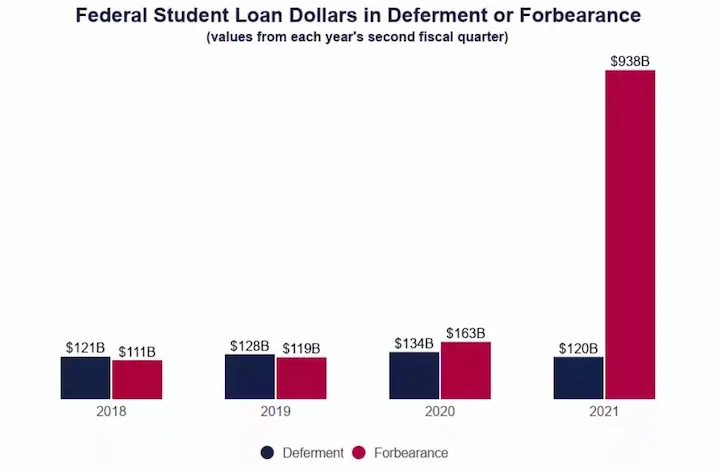What is better: Student loan deferment or forbearance?
Deferment is a better option than being forborne if you are eligible. Both are better long-term solutions.
If you need solutions for your student loan debt:
- Help is available: Contact organizations and resources for student loans.
- Payoffs: Learn the difference between deferment and student loan forbearance.
- Learn how to get out of default on student debt.
- Learn how to declare bankruptcy and get rid of student debts in bankruptcy.
- Student loan refinancing and Student loan consolidation: Consider these options to lower your monthly payment or interest rate.
Both forbearance options and deferral options can postpone student loan payments if you cannot afford them. There is a significant difference: Forbearance will always increase your owes, while deferment may be interest-free for some federal loans.
The right decision about defer or forbearance will depend on your situation, and you must consider factors such as your credit score.
- Deferment: This is a good option if you have subsidized federal student loans or Perkins loans and are unemployed or in financial difficulty.
- A forbearance is a good option if you aren’t eligible for deferment or your financial problem is temporary.
Both options are suitable for avoiding student loan default, but neither is the best long-term solution. Consider enrolling in an income-driven payment plan instead of paying off repayment if you don’t anticipate improving your financial situation. Federal student loan borrowers should also know the alternatives to deferment and the type of forbearance they might qualify for.
What is the difference between forbearance and deferment?
Here are some critical comparisons between deferment and forgiveness for federal student loans.
Deferment
Length – Length can vary depending on the type of deferment; some last for three years, while others are available for as long as you qualify. Federal student loan borrowers need to understand the period of time they can benefit from deferment.
Qualification – Requires a qualifying event, such as being unemployed or enrolled at least half the time in school. Federal student loan payments can be postponed during this time, offering temporary relief to the borrower.
Forbearance
Repayment plan – A forbearance allows borrowers to temporarily stop making federal student loan payments or reduce them for a specific period of time.
Process of application – Different forms for deferments require different forms. Your student loan servicer should receive the correct format and all documentation.
Interest accrual – Perkins and subsidized federal student loans do not have an interest.
Availability – If you meet the eligibility requirements and have sufficient deferment time, your servicer will grant you a Deferment.
Credit impact – The deferment of student loans does not affect your credit history.
Types of loans – Student loans fall into two categories: direct loans and other loans. Direct loans are part of a federal program that offers federal benefits such as deferment.
Loan term – The length of time you have to repay the loan is the repayment term. Each loan has a different repayment term.
Forbearance
Length – No more than 12 months at a given time. Federal loans have no maximum.
Qualification – It is not usually necessary to qualify for a particular event.
Application process – A single form is necessary for “general forbearance,” but servicers may grant forbearance by phone.
Interest accrual – All loans are subject to interest accrual.
Availability – The forbearance availability is usually up to your servicer. However, in certain cases, forbearance may be mandatory.
Credit Impact – Student loan forbearance does not impact your credit.
Log in to studentaid.gov to find out which type of federal student loan you have. To identify loans that won’t earn interest while deferred, look for “Perkins” and “subsidized” loans.
You can use forbearance and deferment retroactively to catch up if you have missed payments but have yet to default on your loans in default.
Which is better, deferment or forbearance?
- Student loan deferment can be better than forbearance if you stop paying your student loans. You will need to be eligible for deferment. The following are the reasons you might qualify for a deferment:
- At least half-time attendance at school
- Being unemployed or having full-time employment.
- Federal or state assistance, such as the Supplemental Nutrition Assistance Program or Temporary Aid for Needy Families.
- A monthly student loan payment income less than 150% below the poverty guidelines in your state.
- Active military duty, or the Peace Corps.
- Cancer treatment.
In short-term hardship or loss of employment, forbearance can temporarily relieve your financial stresses by providing a time frame for a pause on payments.
If you have federal student loans, Perkins loans, or subsidized federal student loans, deferring your student loan is a good option. The deferred loans do not accrue interest, so the amount you owe at the end of the moratorium will be the same as when it began. It is a real break from your loans.
Forbearance might be a good option if you aren’t eligible for a deferment but expect to have financial difficulties that will only last a few days.
Take this example: If you were involved in an accident, you must pay a substantial medical bill. Although you currently lack the funds to cover this expense and other unforeseen costs, there is hope for a near-future resolution. While you cannot avoid addressing this situation, you can temporarily place your loans in forbearance.
Also, consider exploring alternatives to student loan, like personal loans, to handle your immediate expenses, which might give you some relief for student loan. This way, you wouldn’t need deferred loans for occasional medical expenses or other unexpected costs, reducing possible financial setbacks. Moreover, using alternatives could shorten the period to pay off the loan principal and improve your financial stability in the long run.
Forbearance allows you to use the money from your student loans towards other bills and then resume your repayment. Despite the higher interest costs, forbearance is likely cheaper than other options like a personal or payday loan. It can offer short-term relief by temporarily pausing your monthly mortgage payments and help you manage your loan balance.
Private student loans: Deferment or forbearance
Private lenders offer deferment programs for military personnel and students enrolled in schools. They might also offer partial claim for some loan types. Lenders provide forbearance for at least 12 months.
Despite their names, deferment and forbearance are the same for private student loans. Interest accrues, and you are responsible for paying it. That’s why it’s crucial to keep making regular payments as much as possible.
It’s a great way to prevent interest from ballooning if your lender offers you the option of making interest payments while you are still in school. This way, you can ensure payment relief during difficult financial situations.
Contact them if your lender doesn’t allow you to defer or forbearance because your student loans are too expensive. You may be able to make time payments or your interest rate temporarily, depending on what your lender offers. Current loans may have more flexibility regarding options, and you may qualify for a loan modification if you’ve experienced a reduction in income.
Consider income-driven repayment instead.
Request income-driven repayment instead if you debate deferment and forbearance due to the long-term inability to afford federal student loans. Some reasons acceptable for income-driven repayment include financial hardship or unstable employment.
Income-driven plans are tied to your earnings and can pay as little as $0 for those unemployed or underemployed. While paying less can cause interest to increase, income-driven repayment offers the additional benefit of being forgiven after 20-25 years through forgiveness programs.
Repayment options are available for federal and private loans that are in default.
Federal student loan default means income-driven repayments, deferments, and forbearance no longer work. Borrowers can return these loans to good standing through loan rehabilitation or consolidation. Private loans are not eligible for this. Remember that consistent time payments can help prevent default and maintain good standing with your lender.
Private student loan default can limit your recovery options. You may need to consult a student loan lawyer to help repay your debt completely.
You can also get help from a lawyer to determine if your statute of limitations has expired on student loans. It would reduce the possibility of you receiving legal action for past-due debt.

Frequently Asked Questions
What is the main difference between loan forbearance and loan deferment?
Forbearance allows temporarily halting payments while interest still accrues, while deferment pauses both payments and interest accrual for a time.
How does interest accrue during a forbearance compared to a deferment?
Interest still accrues during forbearance but does not accrue during a deferment, increasing overall repayment costs with forbearance.
When should I consider requesting loan forbearance instead of loan deferment?
If you can only pause payments temporarily but not indefinitely, forbearance allows a short break in payments while working toward repayment.
Are there eligibility requirements for both forbearance and deferment on student loans?
Yes, eligibility for both deferment and forbearance depends on federal loan types and meeting certain income, enrollment, and hardship criteria.
How do I apply for forbearance or deferment on my student loans, and what’s the process like for each option?
Contact your loan servicer to apply, submitting required documentation on income, hardship, or enrollment status. Approval timelines depend on the loan type.

